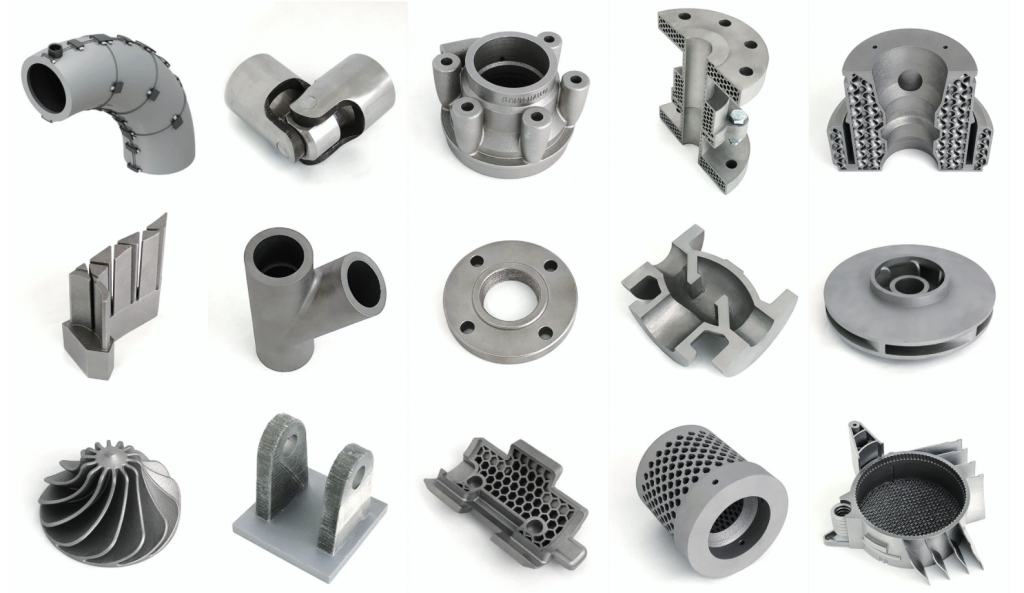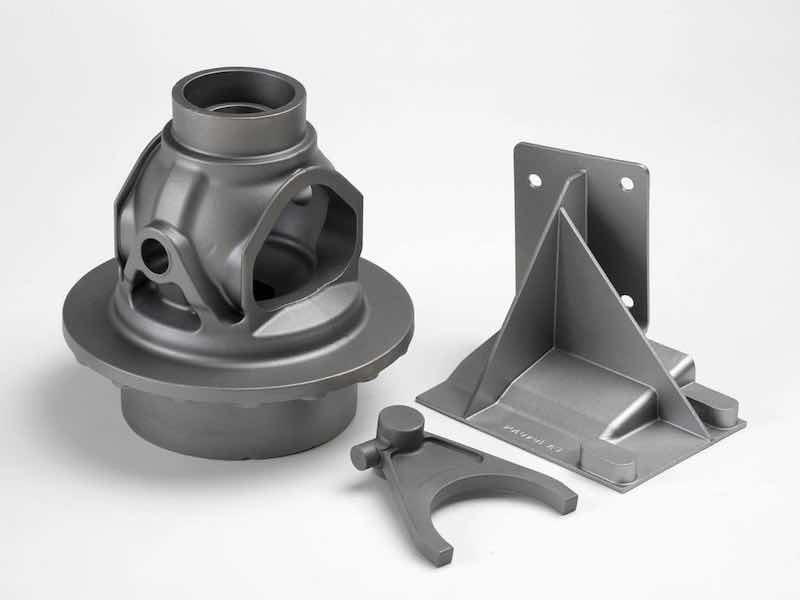How Metal Castings shape innovation in different industries
Discovering the Advantages and Practical Use Aluminum Castings in Today's Market
Light weight aluminum castings have actually ended up being increasingly appropriate in different industries due to their distinct characteristics. Their light-weight nature and resistance to corrosion make them appropriate for requiring applications. Furthermore, the premium strength-to-weight proportion offers considerable benefits in style and manufacturing. As industries remain to discover their capacity, the complete extent of light weight aluminum castings' applications and advantages remains to be totally uncovered. What exists in advance for this functional product?
The Lightweight Advantage of Light Weight Aluminum Castings
Although many products are used in production, light weight aluminum spreadings stand apart mostly because of their lightweight residential properties. This particular makes light weight aluminum spreadings an eye-catching option for various sectors, specifically in aerospace and automotive applications, where weight reduction is vital for enhancing gas performance and efficiency. The light-weight nature of light weight aluminum allows producers to produce components that are less complicated to take care of and set up, ultimately reducing labor prices.
The capacity to generate intricate forms without considerable weight charges enables designers to introduce while preserving structural integrity. Aluminum spreadings can effectively replace larger products, resulting in considerable savings in shipping and functional prices. Their lightweight benefit likewise adds to improved item long life, as lighter components usually bring about minimized deterioration on equipment. In general, the lightweight buildings of light weight aluminum castings provide manufacturers with an affordable edge, cultivating improvements in product layout and efficiency across numerous markets.

Remarkable Corrosion Resistance
Aluminum spreadings possess a natural resistance to oxidation, which greatly improves their longevity in different atmospheres. This fundamental residential or commercial property not just contributes to their longevity however also straightens with the light-weight benefit that aluminum offers. Therefore, aluminum spreadings are significantly identified for their phenomenal rust resistance in numerous applications.

Normally Resistant to Oxidation
One of the standout features of light weight aluminum castings is their outstanding corrosion resistance, which comes from a natural oxidation procedure. When revealed to air, aluminum responds to create a thin, safety layer of aluminum oxide. This layer acts as an obstacle against further oxidation and shields the underlying metal from harsh aspects such as moisture and salts. Unlike various other metals, this oxide layer is self-repairing; if harmed, it swiftly reforms when subjected to air. This unique home enhances the long life of aluminum spreadings in different atmospheres, making them excellent for applications in industries such as aerospace, auto, and marine. Subsequently, the natural resistance to oxidation considerably reduces upkeep expenses and increases the dependability of light weight aluminum spreadings in demanding conditions.
Lightweight Toughness Advantage
The light-weight nature of aluminum spreadings contributes substantially to their sturdiness, making them a useful choice in different sectors. This phenomenal sturdiness is largely associated to light weight aluminum's natural resistance to corrosion, which is boosted even more with anodizing and various other surface area treatments. Unlike numerous steels, aluminum does not rust; instead, it develops a safety oxide layer that guards it from ecological damages. This residential property is particularly advantageous in sectors such as automotive and aerospace, where weight decrease is important without endangering toughness. Furthermore, the durability of light weight aluminum spreadings lessens maintenance costs and replacements, offering economic benefits in time. Their light-weight sturdiness and deterioration resistance placement light weight aluminum castings as a remarkable product for contemporary manufacturing applications.

Superior Strength-to-Weight Ratio
An amazing attribute of light weight aluminum spreadings is their premium strength-to-weight proportion, that makes them very preferable in numerous applications. This inherent residential or commercial property enables light weight aluminum castings to endure substantial stress while staying light-weight, an essential consider industries such as aerospace, vehicle, and manufacturing. Engineers often favor light weight aluminum castings for components that need both sturdiness and minimized weight, boosting fuel effectiveness and performance.
The high strength-to-weight proportion additionally promotes the layout of complex shapes and structures, making aluminum spreadings versatile for facility applications. Furthermore, the capability to keep architectural integrity under challenging problems warranties longevity and reliability in items, from airplane frames to vehicle components. This benefit contributes to the expanding pattern of using light weight aluminum spreadings in ingenious designs, inevitably resulting in improved capability and performance throughout varied markets. Consequently, the premium strength-to-weight ratio of aluminum castings places them as an essential material in contemporary engineering and manufacturing.
Cost-Effectiveness in Production
Cost-effectiveness in aluminum spreading manufacturing is mainly achieved through lowered material waste and reliable production processes. By maximizing styles and utilizing sophisticated strategies, producers can decrease excess product use while keeping high quality standards. This method not only lowers manufacturing expenses but also adds to more lasting techniques within the industry.
Decreased Material Waste
Decreasing material waste in aluminum casting processes considerably improves manufacturing efficiency. By enhancing the layout and production strategies, firms can minimize excess scrap and boost source utilization. This reduction in waste not only reduces material expenses however likewise contributes to an extra lasting manufacturing version. The capacity to reuse light weight aluminum more assistances cost-effectiveness, permitting suppliers to redeem and recycle products without endangering quality. As the industry progressively focuses on sustainability, reduced product waste aligns with environmental objectives while simultaneously boosting earnings. Inevitably, reliable use resources strengthens the affordable placement of organizations in the marketplace, making aluminum spreadings a positive choice in different applications. The calculated method to minimizing waste mirrors a dedication to both economic and environmental responsibility.
Efficient Production Processes
While conventional production processes can sustain considerable costs, light weight aluminum casting supplies an extra effective alternative that boosts total manufacturing productivity. This technique decreases product waste and enables specific control over the manufacturing procedure, resulting in lowered labor and functional prices. The capability to generate complicated forms with fewer actions even more simplifies manufacturing, adding to shorter preparations. In addition, light weight aluminum's lightweight nature and superb thermal conductivity enable power cost savings throughout production and in the last application. By making use of modern casting innovations, manufacturers can accomplish greater throughput without sacrificing high quality. Aluminum casting stands out as a cost-efficient service, making it an attractive choice for organizations intending to optimize their production procedures in today's competitive market.
Flexibility Across Industries
Aluminum castings demonstrate amazing versatility throughout various industries, as they can be tailored to meet certain demands and applications. In the vehicle industry, aluminum spreadings are made use of in engine blocks, transmission real estates, and wheels, offering lightweight yet resilient remedies that boost gas performance. The aerospace industry additionally gains from aluminum spreadings, utilizing them in architectural parts and engine parts as a result of their strength-to-weight ratio.
In the durable goods market, makers employ aluminum spreadings for products varying from cooking equipment to furnishings, giving both visual charm and performance. The electronics market makes use of light weight aluminum spreadings for real estates and warm sinks, making certain effective thermal management. Additionally, the construction industry leverages light weight aluminum castings for architectural aspects and architectural parts, boosting sturdiness and style adaptability. This broad applicability highlights aluminum spreadings as an essential resource, fulfilling the diverse requirements of different markets while maintaining high performance and reliability.
Sustainability and Ecological Effect
As industries significantly prioritize lasting methods, aluminum castings arise as a green choice due to their recyclability and reduced environmental footprint. Light weight aluminum is just one of the most recycled products worldwide, with the capacity to be repurposed multiple times without destruction of quality. This characteristic greatly decreases the demand for basic materials and power usage related to key aluminum manufacturing, which is energy-intensive.
Additionally, aluminum spreadings add to light-weight designs, leading to sustain efficiency in transportation applications such as automotive and aerospace sectors. Their resilience and resistance to rust expand item life-spans, further lessening waste click site and source usage over time. Numerous suppliers are taking on accountable sourcing and eco friendly manufacturing techniques, boosting the sustainability of light weight aluminum casting processes. In general, light weight aluminum castings represent a functional solution for companies aiming to minimize their ecological impact while attaining efficiency and effectiveness.
Technologies in Aluminum Casting Technologies
Current improvements in aluminum casting technologies have considerably improved the effectiveness and high quality of production procedures. Developments such as 3D printing and advanced mold-making strategies have Click Here enabled producers to develop detailed designs with reduced product waste. This shift not only boosts the accuracy of actors elements but additionally shortens lead times, permitting fast prototyping and faster market access.
The incorporation of advanced computer simulations aids in predicting prospective issues throughout spreading, leading to higher-quality results. The use of lightweight alloys has actually likewise contributed to the advancement of stronger, much more long lasting items, providing to markets varying from vehicle to aerospace
Furthermore, automated spreading procedures have emerged, reducing human mistake and enhancing production speed. Jointly, these technologies are changing the aluminum spreading landscape, driving higher competition and sustainability in production. As industries remain to evolve, these technologies will play a vital duty in meeting future needs for efficiency and high quality.
Frequently Asked Concerns
How Do Light Weight Aluminum Castings Contrast to Other Steels in Terms of Thermal Conductivity?
Light weight aluminum spreadings exhibit premium thermal conductivity contrasted to several steels, such as steel and iron - Aluminum Foundry. Their lightweight nature and efficient heat distribution make them perfect for applications needing reliable thermal monitoring in numerous sectors
What Are the Typical Problems Located in Aluminum Castings?
Common defects in aluminum spreadings include porosity, shrinking, incorporations, and surface abnormalities. These issues commonly develop from incorrect cooling rates, inadequate mold and mildew design, or contaminations, impacting the total high quality and performance of the final product.
Can Light Weight Aluminum Castings Be Recycled, and Exactly how?
Light weight aluminum spreadings can be reused effectively. The procedure involves accumulating, melting, and reforming the aluminum, which minimizes waste and conserves sources. This reusing adds to sustainability while keeping the product's properties for future use.
What Are the Normal Lead Times for Aluminum Spreading Production?
Typically, preparations for aluminum casting manufacturing range from 2 to six weeks, relying on factors such as intricacy, tooling demands, and manufacturing volume. Effectiveness can improve with well established supplier connections and optimized manufacturing procedures.
Exactly how Does the Surface Area Complete Affect Light Weight Aluminum Spreading Efficiency?
The surface finish markedly influences light weight aluminum spreading performance by affecting deterioration resistance, visual quality, and rubbing attributes. A smoother surface enhances durability and performance, while a rougher appearance can improve adhesion for succeeding coatings or therapies.
Many materials are utilized in manufacturing, aluminum castings stand out mainly due to their light-weight residential or commercial properties. When exposed to air, light weight aluminum reacts to form a slim, protective layer of aluminum oxide. Cost-effectiveness in light weight aluminum casting manufacturing is mostly accomplished via decreased material waste and effective production procedures. Decreasing material waste in aluminum spreading procedures significantly enhances production performance. Inevitably, efficient use of raw products strengthens the competitive placement of companies in the market, making view website light weight aluminum castings a positive alternative in various applications.